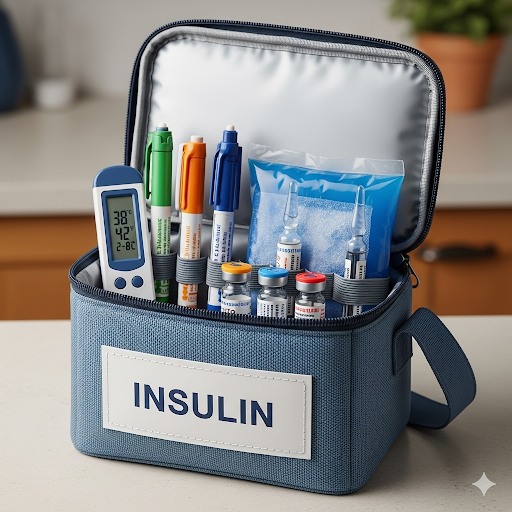Here’s a comprehensive list of common Type 1 Diabetes (T1D) terms and their definitions. This list is great for families, teachers, caregivers, or anyone new to T1D.
🔬 Medical Basics
- Type 1 Diabetes (T1D): An autoimmune condition where the pancreas stops producing insulin, a hormone needed to allow sugar (glucose) to enter cells for energy. People with T1D must take insulin every day.
- Insulin: A hormone that helps glucose enter cells from the bloodstream. People with T1D take insulin through injections or a pump.
- Glucose: A simple sugar that is the body’s main energy source, found in the bloodstream and affected by food intake and insulin.
- Blood Glucose (BG): The amount of sugar in the blood. Measured in mg/dL (US) or mmol/L (internationally). Target range is typically 70–180 mg/dL.
- Hyperglycemia: High blood sugar, usually over 180 mg/dL. Can cause fatigue, thirst, and long-term complications if not managed.
- Hypoglycemia: Low blood sugar, usually under 70 mg/dL. Can cause shakiness, confusion, and can be dangerous if untreated.
💉 Insulin & Management
- Bolus Insulin: A quick-acting dose of insulin taken before eating or to correct high blood sugar.
- Basal Insulin: A slow-acting insulin that provides a steady amount of insulin throughout the day and night.
- Insulin-to-Carb Ratio (ICR): The amount of insulin needed per grams of carbohydrate eaten (e.g., 1 unit for every 10g carbs).
- Correction Factor / Insulin Sensitivity Factor (ISF): How much 1 unit of insulin lowers blood sugar (e.g., 1 unit drops BG by 50 mg/dL).
- Carb Counting: Tracking carbohydrates in food to calculate how much insulin is needed.
- SWAG: Abbreviation for scientifically wild a** guess- used when trying to guess the carbs in a certain food item or meal.
🧪 Testing & Devices
- Continuous Glucose Monitor (CGM): A wearable device that tracks blood sugar levels every few minutes via a sensor under the skin.
- Blood Glucose Meter (BGM): A handheld device used with a fingerstick drop of blood to check BG levels.
- Lancet: A small needle used to prick the finger for blood glucose testing.
- Test Strips: Strips used with a meter to read a blood sample and show BG level.
- Ketones: Chemicals the body makes when it burns fat instead of glucose for energy. High ketones can signal a serious condition called DKA.
- Ketone Strips: Used to test urine or blood for ketones, especially when sick or when BG is very high.
🩺 Health & Safety
- DKA (Diabetic Ketoacidosis): A dangerous condition caused by a lack of insulin, leading to high BG, high ketones, nausea, vomiting, and dehydration. It requires immediate medical attention.
- Glucagon: A rescue medication used to treat severe low blood sugar. Comes as an injection (traditional or auto-injector) or nasal spray (like Baqsimi).
- Honeymoon Phase: A period after diagnosis when the pancreas still produces some insulin, making blood sugar easier to control temporarily.
- A1C (Hemoglobin A1C): A blood test that shows average blood glucose over 2–3 months. Often used to assess long-term management.
📱 Tech & Tools
- Insulin Pump: A device worn on the body that delivers insulin continuously (basal) and in doses at meals (bolus).
- Pod (Omnipod): A tubeless insulin pump that sticks to the skin and delivers insulin wirelessly.
- Closed-Loop System / Artificial Pancreas: A system where a CGM and insulin pump work together with an algorithm to automate insulin delivery.
- Site / Infusion Site: The area on the body where insulin is delivered by a pump or where a CGM sensor is inserted.
🧍 Everyday Life
- Low Snack / Fast-Acting Carb: A quick sugar source (juice, glucose tabs, candy) used to treat low BG.
- Slow-Acting Carb: A longer-lasting carbohydrate (crackers, peanut butter, granola bars) to prevent BG from dropping again after a low.
- Diabetes Burnout: Emotional exhaustion from the constant work of managing diabetes.
- 504 Plan: A legal plan for U.S. students with chronic conditions, ensuring they get accommodations and support at school.
- Endocrinologist: A doctor who specializes in hormone-related conditions, including diabetes.







